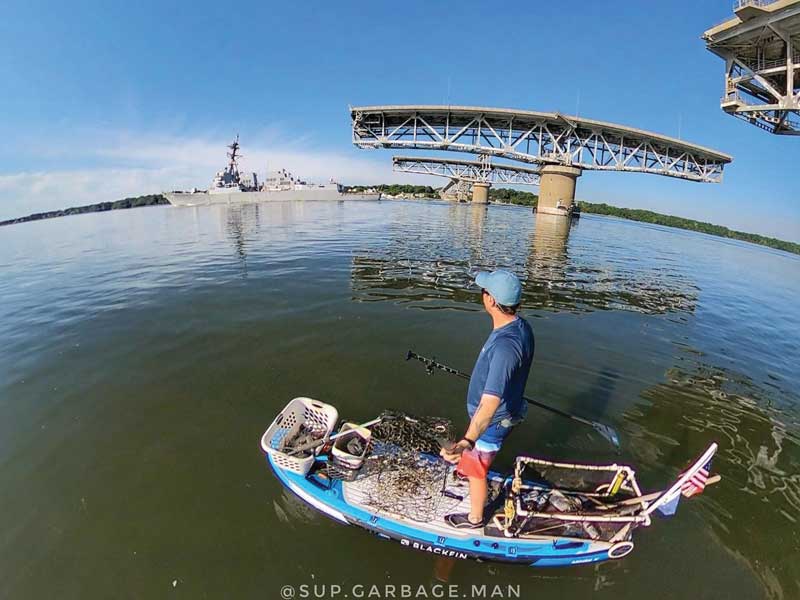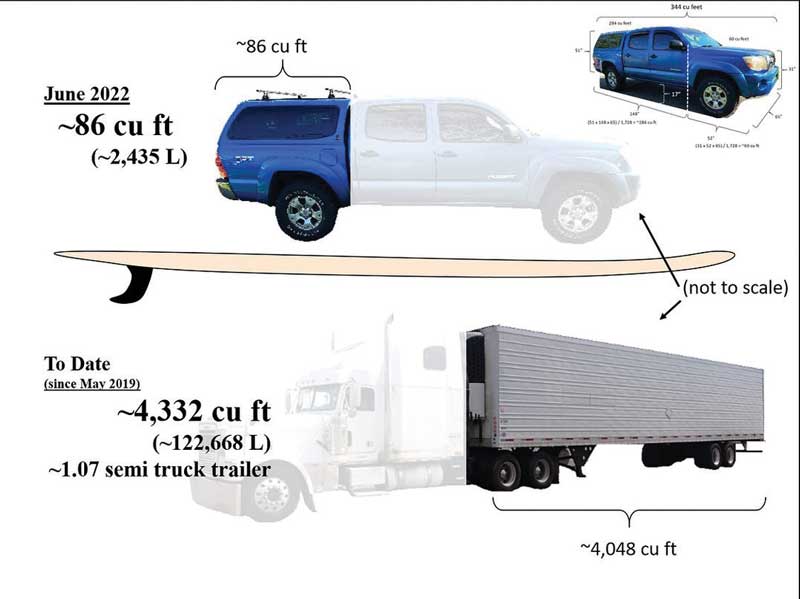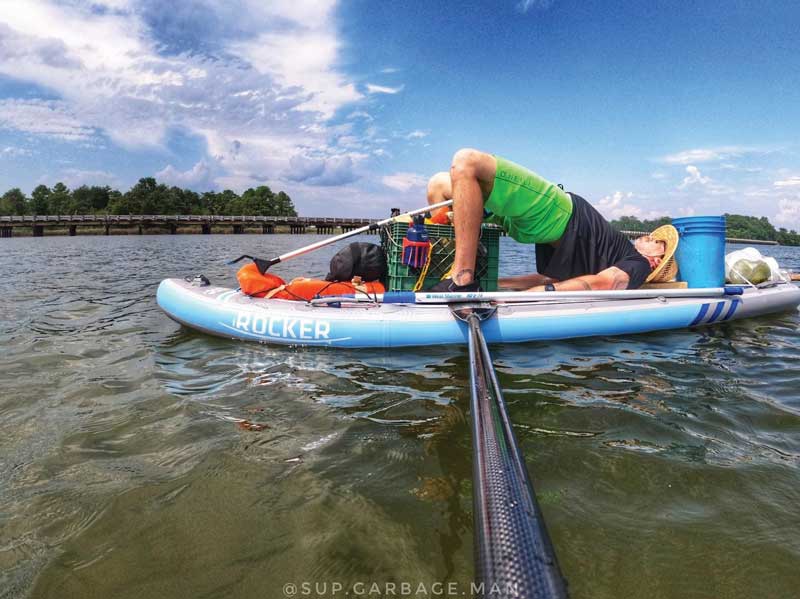Joe Wright, known on social media as the SUP Garbage Man, has picked over 4300 cubic feet of trash out of the rivers surrounding the Chesapeake Bay on his stand up paddleboard alone. That’s just over an entire 18-wheeler-semi-truck-bed full of one man’s trash consciousness. Wright began standup paddleboarding (SUP for short) regularly in 2019. Loading the board onto his truck for a paddle before work or over the weekend, he found himself always picking up whatever trash floated by. It wasn’t long before he set off with a little more organization—a milk crate and plastic trash picker. He’d paddle along while simultaneously picking up trash.

Then, he upgraded to a laundry basket. Before long the bins became amphibious, the pickers multiple, with gloves and sorting containers, and then hauling it all back for further reuse, recycle, or proper disposal on land.
Then, he started a nonprofit under the name SUP Garbage Man so that he could accept donations and sponsors, which had already started rolling in. He launched his website supgarbageman.org and social media. It is in no way a full-time gig, but that doesn’t mean Wright doesn’t dream of it someday being that way.
“Who knows,” he said. “A garbage truck painted colors I can travel with and paddleboard doing clean up campaigns on the coast.”
Or, perhaps it evolves to Wright promoting campaigns that teach people and recreational SUP and kayak companies how to autonomously clean up trash. Maybe one day he could have an employee as a coordinator, but for now it’s a one-man show. Well, two, if you count his wife, who goes by Mrs. SUPgarbageman on social media.

But Wright doesn’t want to organize much further beyond that. It was always intended to be somewhat of a solo, anonymous mission that proved, “Introverts can go out and change the world all on our own.”
Wright lives somewhere near the Potomac River; he’s originally from somewhere else in Florida. Up until recently he never shared his name, and he still tries not to share his face—choosing to cover it with a buff in published pictures. He doesn’t tell what he does for a day job, or where he stands on any political or social or personality spectrum. All he stands on is his paddleboard and the platform that one person’s recreational hobby can make a huge environmental impact. And if everyone did that, the effects could be colossal.
So why not take the image one step further?
Imagine this: it’s 10 years from now and every self-propelled watercraft comes with basic, built-in trash collecting systems. The weekend paddleboarders, kayakers, full-time cruisers in dinghies, even bicyclists, walkers, and runners are all equipped with the means to pick up at least some trash while doing recreational activities. Some of the systems are autonomous and more expensive, while others are basic. All are supported for your average income and average person.
Every landing and beach are equipped with large disposal systems that get emptied, and all trash is then properly disposed of far from the waterways.

While this may sound like a utopian future where personal and social responsibility overlaps apathy on a whole, Wright is already an example that one person doing a recreational activity can simultaneously make an impact.
“It was always my intention to keep it anonymous and hands on while putting in the work, and to show people they can make a difference doing whatever they like to do,” he said. “For me it’s paddleboarding. I look at this project as a marathon, not a sprint—and I’m not sure what it might look like one day.”
In the winter he dons a full wetsuit and aims for a paddle every day before work at sunrise. It’s become a ritual and meditation. Wright has even been known to pose and post yoga poses from his SUP full of trash. Now that takes balance!
He said his affinity for collecting trash from nature probably stems from being a little kid and going out on walks with his mom, where she encouraged him to pick things up and be more aware of what was around him. He thinks this can be incorporated into the nonprofit to teach families how to get their kids curious about their environment and outside impacts early on in life. That is what will eventually create a better future. Will there be a Baby SupGarbageMan in the future?
Time will also tell.
“It’s not about me,” he said. “There are many different people, and many different ways. There is plenty you can do on your own. Everyone has a role. Nothing positive comes from shaming anybody for using plastic or disposable products. This trash already exists, and we all use it.”
So, we are all responsible for cleaning it up.
The SUP Garbage Man accepts donations of all kinds from cash to sunscreen, paddling gear, protective clothing, trash collecting bins, and more. Contact him by emailing [email protected].
By Emily Greenberg